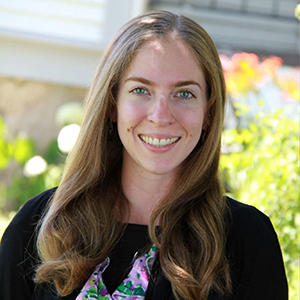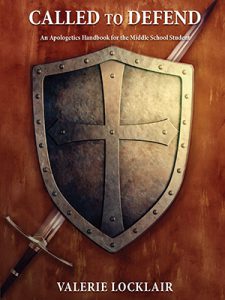
It's safe to say the average middle schooler won't enter high school without a firm grasp of the core competencies of education—or at least that's the hope. But is the same attention being paid to their ability to defend their faith?
When the questions inevitably start rolling in—Why do you believe what you believe? Aren’t you arrogant for thinking that you’re right and everyone else is wrong? Isn’t Christianity just a bunch of mythology?—will adolescent Christians know how to respond?
With her first published effort, Valerie Locklair, systems administrator for Concordia University Wisconsin’s computer science department and a CUW alumnus, seeks to help.
“Called to Defend: An Apologetics Handbook for the Middle School Student” provides middle schoolers with an interdisciplinary introduction to defending the faith. Using the subjects of mathematics, computer science, history, and creative writing, readers will learn how to be unapologetically Lutheran, even at a young age.
The book, which launched mid-March 2018, is available for purchase here. Learn more about the author here.
 Q. What led you to write this book?
Q. What led you to write this book?
A. This book began as one of two ideas for a thesis for the International Academy of Apologetics, Evangelism, and Human Rights in Strasbourg, France, which I had the honor of attending a couple years ago. I received a Diploma of Christian Apologetics from the academy in 2016 and was named a Fellow. The thesis I defended for the diploma became my book.
Frankly, I didn’t have much hope that the topic would be approved. Apologetics for the younger generation was something that I was just beginning to investigate at the time, and I do not have a formal background in education. It struck me, however, that there were very few resources for the younger generation when it comes to apologetics, and I wanted to encourage our youth to question their faith. I think everyone has that deep, haunting question that they hope no one ever asks them, and when this question pertains to Christianity, it can be even more troubling. The answer isn’t to ignore our questioning youth, but to engage them on an age-appropriate level and to lead them to the one true answer, Jesus Christ Himself.
Q. Are there any personal experiences or struggles you’ve had that influenced your writing?
A. Writing this thesis-turned-book was a difficult process for me. It is quite easy to think about apologetics abstractly and to come up with arguments that you can neatly dismantle from behind the safety of your computer screen. It is another thing entirely to engage in real, messy, difficult conversations with individuals whom you love very much. For example, in the book, I list two examples that happened to me personally when I was roughly the age of a middle school student. In one case, someone wasn’t sure if the fact of the Virgin Birth was really true, and in another, a pastor rebuked a student for having a legitimate question about witnessing under pressure. In both cases, I was silent. I knew it was wrong, but I didn’t know how to respond in love, so I buried my head in the sand and hoped that the problem would go away.
I also recount examples of apologetical conversations I have had in my own life (spoiler alert: they don’t end “and they lived happily ever after”). In many cases I have grieved deeply after a rejection, and I tend to wonder, “If I had only said this, would the outcome have been any different?” These accounts are included to highlight the very real applications this topic has. We dare not think that those who confront us with questions about our faith are somehow inferior to us or that they are objects to be used in our quest to win a debate. The individuals we come into contact with are human beings created in the image of God, priceless souls for whom Christ chose to die and rise again. My sinful nature wants to rear its ugly head and ground the apologetical task on whether I “win” or “lose,” but the fact is that we are not called to be successful by any earthly standard.
The title of the book is based off one of my favorite quotes by Concordia professor Dr. Angus Menuge: “We aren’t called to be successful. We’re called to be faithful.”
Q. It’s unique that you use math, computer science, history, and creative writing to teach students to defend the faith. Why incorporate school subjects?
A. We too often succumb to the idea that “religious studies,” whether catechesis, apologetics training, or even Bible study, is somehow entirely separate from the rest of life. We can live our lives in a 9 to 5 sort of way, treating our faith as a job to which we can clock in and clock out when it is absolutely necessary, but living la vida loca after hours. If Christianity is true, it impacts all of life, including “traditional” school subject areas.

Q. Give us a taste of how incorporating these subjects can be a powerful tool for teaching apologetics.
A. By using subjects that intersect with so-called “secular” life, we can reinforce the fact that Christianity is incredibly holistic. It speaks to the whole person. In the section on computer science, for example, we talk about something called the problem solving paradigm. It’s a basic procedure that computer scientists and technologists use for understanding a problem and working to solve it. This framework—or mindset, as computer scientist Don Knuth terms it—is not restricted to the world of technology. In order to defend the faith, one must start by understanding both Christianity itself and what objection someone is lobbying against it.
For example, imagine someone says to you, “The Bible is full of contradictions! It can’t possibly be true.” How do you respond? I would suggest that we honestly don’t have enough information to make an informed, intelligent response to this question. We don’t even know if we are defining our terms in the same way (what is a contradiction, anyway?). We need to pause, take a deep breath, and get some clarity before we can actually respond in truth and love.
Q. At Concordia, we are ever-striving to prepare our students in “mind, body, and spirit for service to Christ in the Church and world.” How does your writing hit on this theme, and how might it seek to similarly challenge or equip readers?
A. The interdisciplinary nature of this book seeks to treat both the body of knowledge and human beings themselves holistically. We are both intellectual and emotional beings, and the shocking thing about Christianity is that it treats the whole person. The incarnation—God becoming fully human in the person of Jesus Christ—dispels the idea that either mind is more important than body or that body is more important than mind. By treating humans holistically, incorporating different subject areas, and taking a decidedly Lutheran approach to apologetics, I pray that students may be prepared in mind, body, and spirit to defend the faith.
Q. What is your ultimate hope for those who pick up a copy of your book?
A. If nothing else, I pray that readers will be encouraged to find the one question they hope no one ever asks them about their faith—and then investigate it. If there is an aspect of Christianity that seems unclear to us, we will be uncomfortable sharing the Good News of Jesus Christ with the world around us. I pray that the book may be an encouragement to students as they reach out to family and friends who are hurting and questioning their faith, because all of us hurt and question at some point in our lives. I also hope the book will be an encouragement to all of us to take the questions of the next generation seriously, and to recognize that our youth are facing real challenges to their faith that we should be equipping them to meet.
J.S. Bach ended his musical compositions with the letters SDG, which stood for the Latin phrase Soli Deo Gloria: To God alone be the glory. May we never forget that the battle for our soul has already been won by the life, death, and resurrection of Jesus Christ, and that He will call, enlighten, and equip us to give an answer to those who ask us for the reason for the hope that is within us. In the spirit of Bach, I’ll end the same way: SDG.
— This story is written by Kali Thiel. Kali was Director of University Communications until April, 2025.
If this story has inspired you, why not explore how you can help further Concordia's mission through giving.